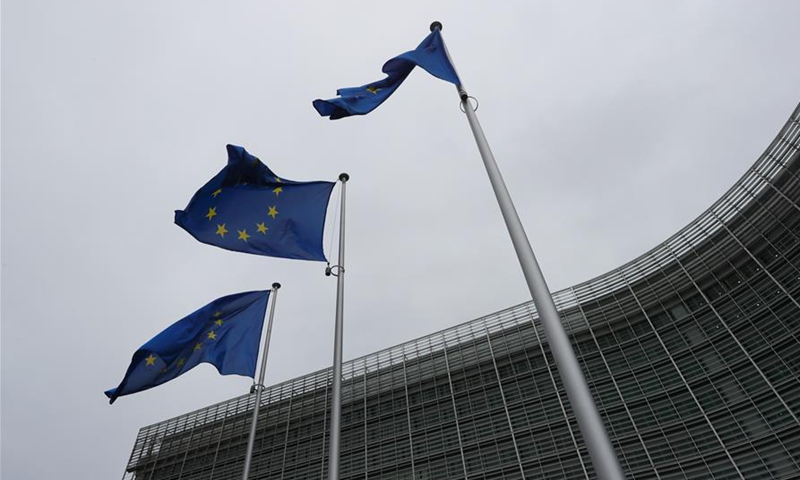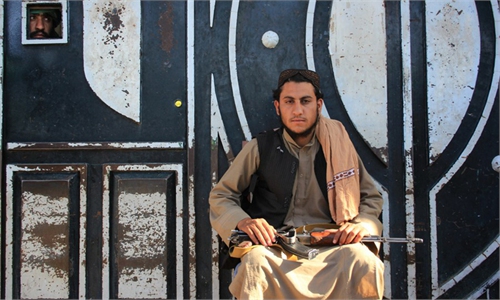
Flags of the EU fly in front of the headquarters of the European Commission in Brussels, Belgium, June 30, 2020. (Xinhua/Zheng Huansong)
In a recent interview with French news agency AFP, the foreign policy chief of the EU Josep Borrell argued that what happens in Afghanistan now proves Europe the needs to develop a military capability independent of the US. He also promised to "propose to give the Union a 50,000-strong expeditionary force, capable of acting in circumstances like we're seeing in Afghanistan."This is yet another of Europe's hindsight reflections since the hasty withdrawal of US troops from Afghanistan. It is also another promise to build up the European defense integration. But even the Ukrainian crisis, which is still simmering in Europe, has failed to promote the further development of defense integration. So how big is the chance that an issue thousands of kilometers away from Europe will help achieve a similar goal?
It is undeniable that various scenes of utter chaos in Afghanistan have stimulated Europe strongly. European media are now filled with outrage, worries and even fears. In the eyes of Europeans, the pullout of US forces is a dogmatic and selfish move because it lacked any accurate information or thoughtful plan. Moreover, Washington didn't even communicate and consult with its allies. Armin Laschet, the conservative candidate for German chancellor, described the Afghan crisis as "the biggest debacle that NATO has suffered since its founding."
However, at the same time, the lack of military capacity in Europe has left Europeans frustrated. Europe has faced obstacle after obstacle during the evacuations from Afghanistan due to its inadequacy of information and controlling power over airports and their security. The EU has deeply felt the geopolitical difference with the US regarding the Afghan issue. Clearly, Afghanistan is important to Brussels' security but of little value to Washington.
What's worse, Afghan Taliban's victory marks the drastic changes in Afghanistan where the West has put so much effort all these years. It not only highlights the failure of the export of Western-style democracy, but also proves that the slogan "America is back" is only for show.
A new era of competition between the great powers is approaching. At such a historical point, it is blind and dangerous to put safety in the hands of someone else, especially the untrustworthy ones. "The Europeans don't have a choice. We must organize ourselves to deal with the world as it is and not the world that we dream of," Borrell pointed out. Therefore, the proposal of enhancing European military capacity after the Afghan crisis is the natural extension of European strategic autonomy.
In fact, Europeans have made many efforts to construct the security integration in Europe in recent years. This has transpired under the pressure of the regional security situation, and the urging of strategic autonomy. For instance, French President Emmanuel Macron proposed the European Intervention Initiative in 2017. Now 13 countries in Europe have joined this project, which is a step closer to the establishment of the "European army." In 2020, the EU also started to develop a Strategic Compass for security and defense. The program aims to operationalize the EU's strategic autonomy, refine its level of ambition and better link its strategic, operational and capability needs. The Compass is expected to be adopted by the first half of 2022.
This series of actions has achieved some breakthroughs in terms of the EU's defense integration. Indeed, this is making the integrating process flourish. However, there are still some quite obvious shortages in the EU's construction of European defense capacity. Europe's progress in the development and installation of new military weapons is more in name than in reality. The same is true for the coordination and improvement of the intelligence system.
This is mainly because NATO has been playing a leading role in Europe's defense. In this respect, the security of Europe has been relying on the arrangement of the US. In addition, each country in Europe has a different direction regarding the development of defense ability. Thus, it is far more difficult to reach an agreement in areas that are not so sensitive. Smaller Eastern European countries have a deep-rooted distrust of powers in West Europe in security issues. In conclusion, the EU's defense construction is more about symbolic cooperation than making substantive progress.
In the face of constant crises, it is hard for the EU to concentrate on a challenging and ineffective cause due to the characteristics of the EU mechanism. This includes the defense buildup. In other words, the EU will face many structural challenges if it wants to change its image of a "military worm." Although the Afghan issue is already included in the EU's vision of global security, we still need to wait and see if Borrell's bold, visionary words can become a reality.
The author is deputy director of Institute of European Studies at China Institutes of Contemporary International Relations. opinion@globaltimes.com.cn

